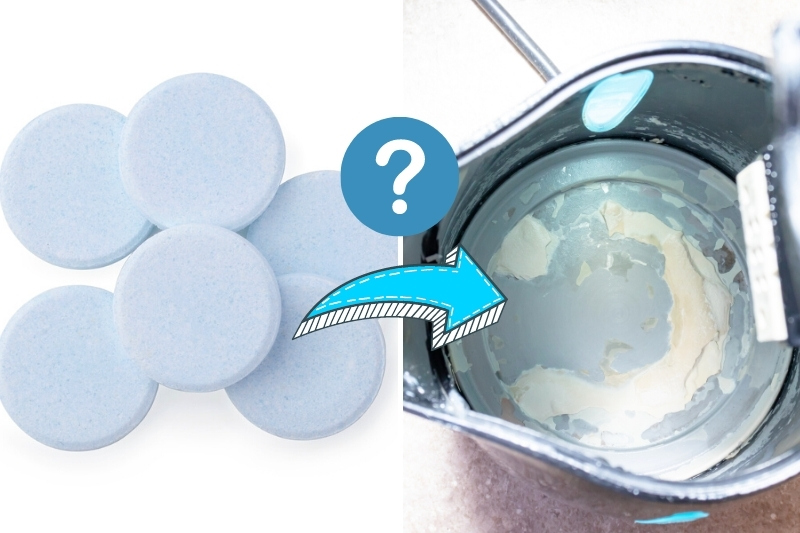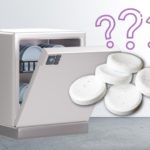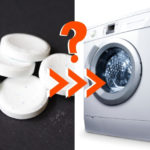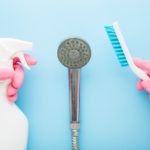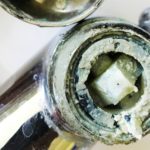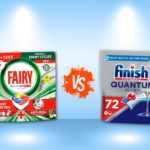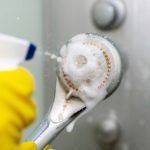Hard water covers 60% of the country. So what? Well, for those living in the hardest hit, it’s a big deal.
The denizens of Swindon, Milton Keynes and Bath (the top three cities in the UK for hard water) will tell you tales of furred-up woe, involving sluggish taps and dribbly showers.
I used to live in Bath and I remember well that if you stayed too long in the tub you would get covered in crystals (but not of the Swarovski variety).
It can sure cause lots of trouble so it needs tackling. And have we the thing to do it? Well, that would be telling. Read on and see. (Spoiler alert: yes, we have.)
Can Denture Tablets Remove Limescale?
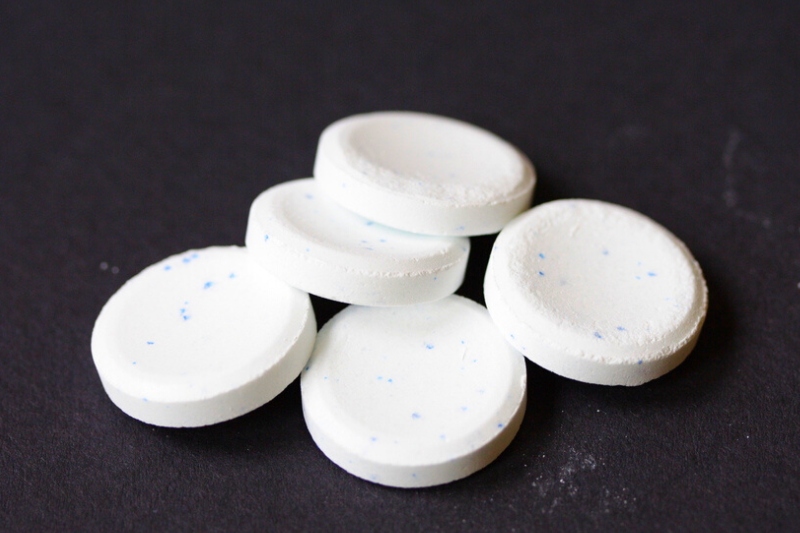
Denture tablets contain a combination of bicarbonate of soda (baking soda) and (usually) a mild bleach. When they dissolve in water, they release these substances, which get to work on dissolving limescale in no time at all.
To clean a kettle, for instance, all you need to do is to fill it with water, drop a couple of denture tablets in, then turn it on as normal.
Of course, remember to empty that tablet solution out and give the kettle a couple of rinses before you use it again!
The element will shine bright like a diamond, as a delighted Rihanna was moved to write when she tried the denture tablet trick on her kettle in Barbados.
Will denture tablets remove limescale without the kettle being turned on? Yes. You can leave the tablets to merrily effervesce in a cold kettle overnight. Think of the lovely start to the day that sparkling new-looking element will give you.
What Else Can Denture Tablets Clean?
Of course, it’s not just kettles that denture tablets can render like new. Dentures, for one thing.
Actually, that’s the thing with these tablets. They have to be able to take care of some pretty full-on staining (especially if the denture-wearer is a full-on red-wine-glugging, black-coffee-slurping, tipless-fag-toking pigment player).
At the same time, they need to be gentle enough to ensure that any dentures left in them will not become deadly to the wearer on putting them in. It’s this gentle strength that makes them ideal for all kinds of limescale removal jobs around the house.
1. Shower heads
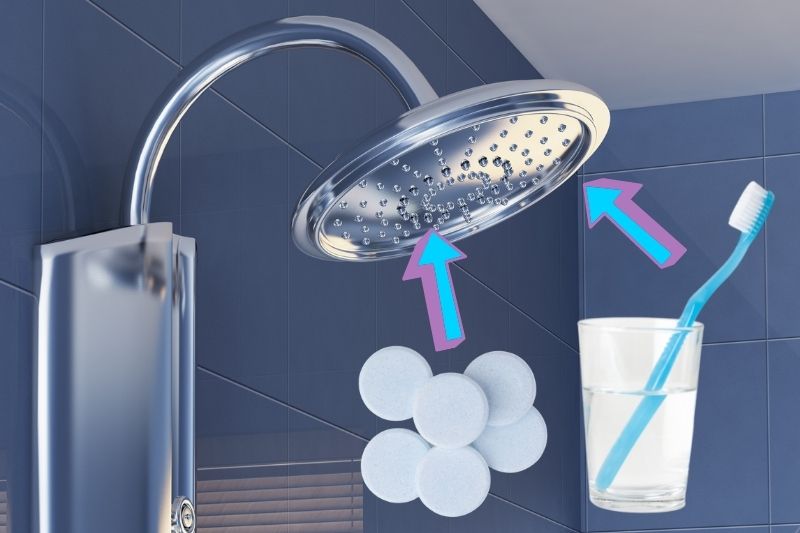
Unscrew your scaled-up shower head, immerse in a solution with two tablets for a couple of hours and see the difference. You’ll gush as much as the shower!
2. Drains
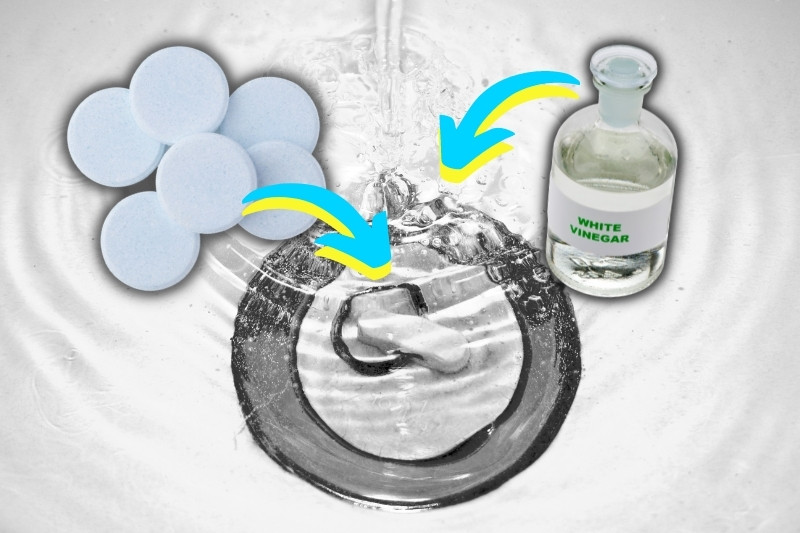
If you’ve got scale-clogged drains, you can opt for environmentally damaging bleaches and chemical unblockers. But the planet will not thank you for it.
Be a friend of the earth by popping three broken-up denture tablets and a cup of vinegar down there instead.
Leave for a few minutes and then run some water down it. Repeat as necessary until that drain is no longer a pain.
3. Laundry
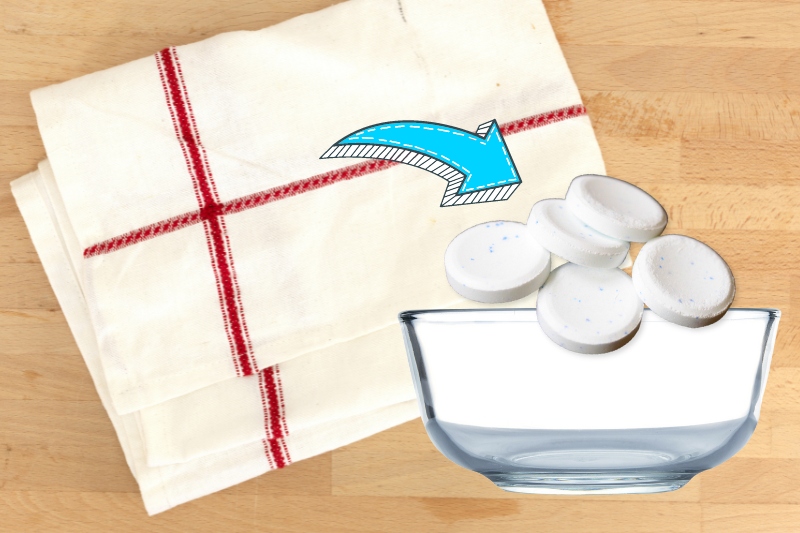
One of the downers of living in a hard water area is that limescale can take its toll on your clothes and make your dresses dingy and your trousers tired.
Give light-coloured clothes a boost by immersing them in a bowl with one to three of those denture dynamos. Leave for an hour and rinse. Your t-shirts and tea towels will teem with gleam.
4. Toilets
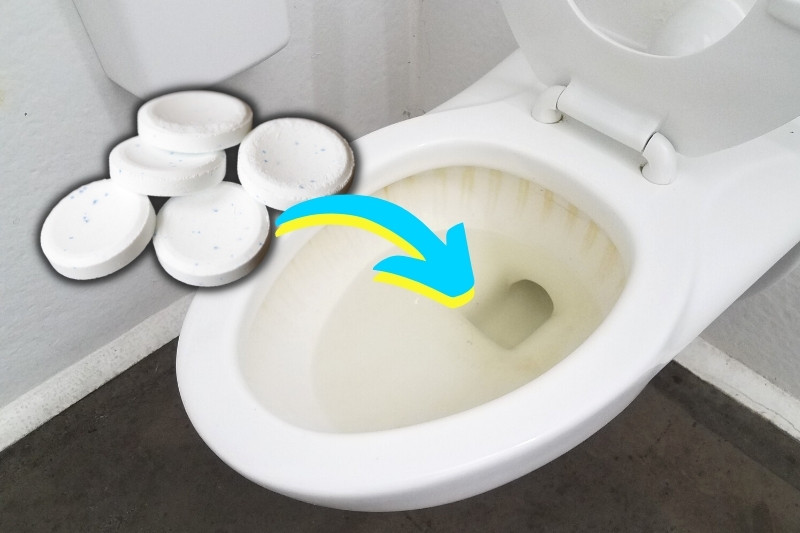
Limescale can do its unwelcome thing to our toilet bowls too, leaving them marked, ringed and sometimes constricted by dratted deposits.
When cleaning your toilet, you can clear out that calcium with a single tablet, dropped in the bowl.
Leave it for 20-30 minutes. Then return to a loo of luxury, a treat of a toilet, a water closet of wonder, a… well, you get the idea.
5. Coffee cups
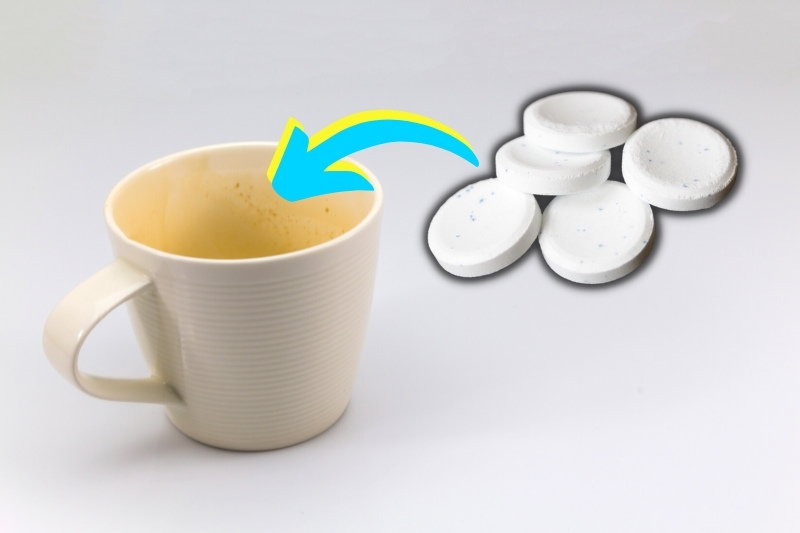
Pimp your mug by treating it to a denture tablet in some water. Leave it to enjoy that fizzing fun for a few minutes, then rinse.
Your newly invigorated cup will thank you for the rest of its life. You can do the same with anything else with stains like this: teapots, carafes, cafetieres, etc.
6. Spectacles
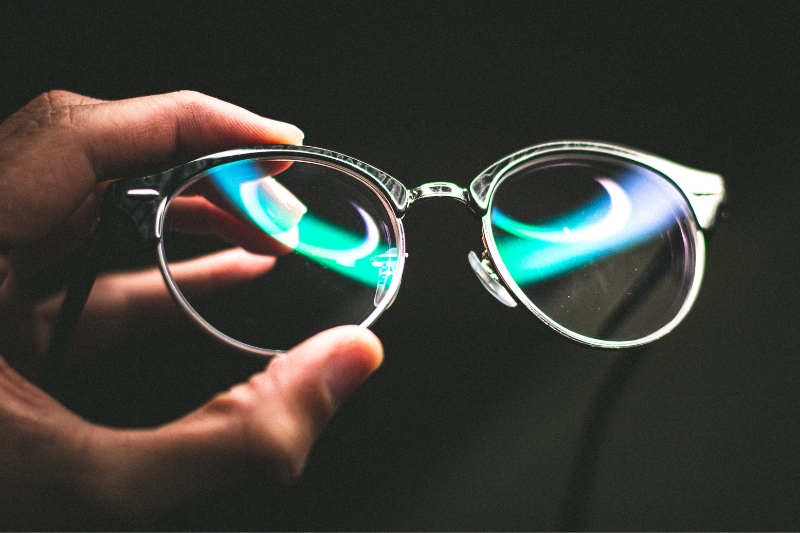
Grimy glasses can be given a sparkle with a single denture tablet dissolved in some water.
Leave for a few minutes then clean with a microfibre cloth. Those lenses will be so clean, you’ll not know you’re wearing them. No, that doesn’t defeat the point.
7. Trainers
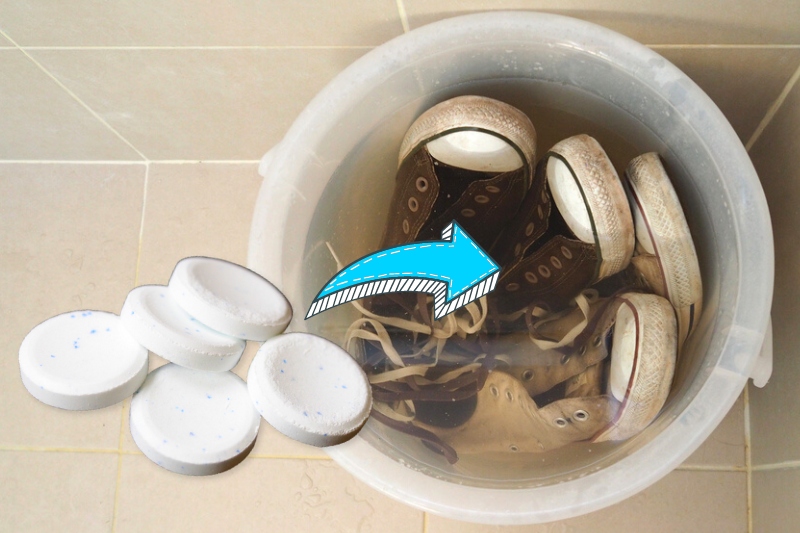
Who knew? Fetid footwear can be cleaned and freshened with the old denture tablet routine.
Chuck three tablets in a bucket of warm water, drop your shoes in and leave for a couple of hours. Everyone will be complementing you on your new shoes.
8. Jewellery
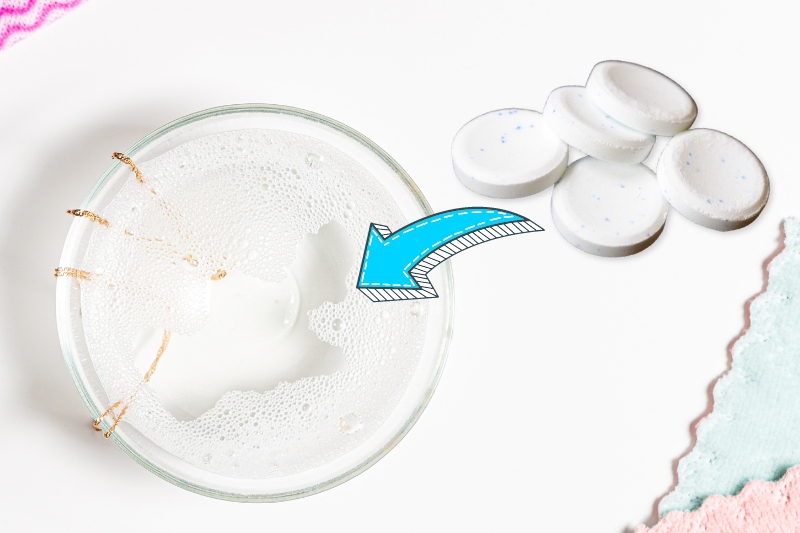
One tablet in a glass of warm water is all you need. Pop your shiny things in there for 20 minutes. Give them a rinse and bask a while in their gorgeous glints. Note – it’s not wise to put softer stones like pearls in with denture tablets.
What Other Methods Are There for Removing Limescale?
Anything acidic, like vinegar or lemon juice, will do a decent job against limescale deposits. Spray it on liberally in a solution of water and leave it on for a few hours, then rinse it off.
Alternatively, you can apply neat with a cloth and rub that scale clean away. This may take some time, as limescale is noted for its tenacity.
You can use the same acidic approach with a washing machine, by pouring a cupful of vinegar or lemon juice (instead of laundry liquid) into your detergent drawer and running a wash cycle. It’s best not to include any clothes, unless you need to keep the mosquitos off.
There are lots of other ways to get rid of limescale. For more serious cases, you might want to consider using a proprietary product like Ecover Limescale Remover.
Or you can try a preventative product like Calgon: used regularly, it’ll keep your washing machine and other appliances limescale free.
Why Is Limescale a Problem?
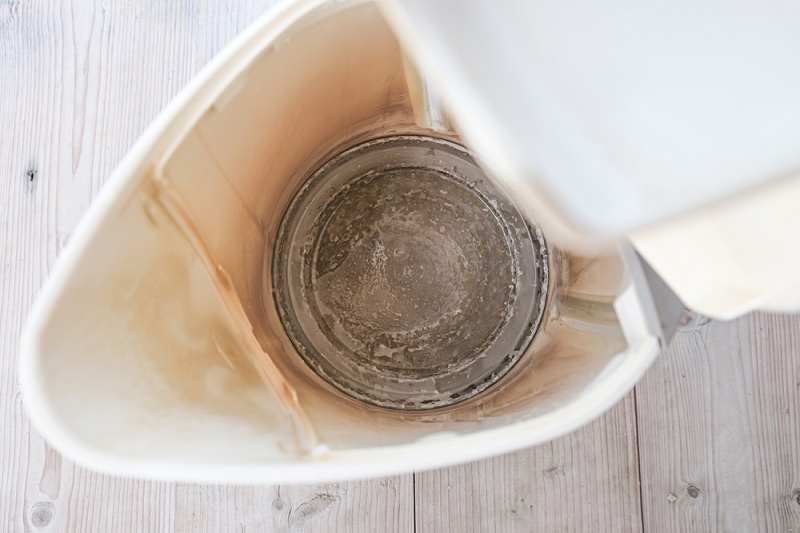
Limescale costs a packet. It makes affected items less efficient. According to the Carbon Trust, if you get it in your heating system it can make bills swell by 7%.
That might not sound like much, but it could add £150 to £200 to your energy bills every year. Now it doesn’t seem quite so trivial, eh?
But it’s not just a major application like your heating that a limescale infestation can send off-kilter. Have you noticed that your kettle takes longer and longer to boil as life goes on? No, it’s not you. Well, probably not. Although you really shouldn’t just sit there watching it.
The inescapable truth is that your kettle element relies on a good clean contact with water in order to do its heating thing. Allow something to get in the way and it’s going to take longer. So, the more that limescale deposits on your element, the longer the boil will take.
But why does limescale build up in the first place? That, my inquisitive friend, is all about chemistry, which, while fascinating to some, is not the remit of this piece, so we won’t go into detail.
Suffice it to say, the dissolved calcium carbonate minerals that are present in water tend to stick around when the water itself has boiled off. Bit like salt from evaporated seawater.
And it so happens that the element provides an ideal spot for the calcium carbonate deposits to set up house. Well, we all like a cosy home.
Is Anything Good About Limescale?
Well, actually, yes. It would seem that those living in hard water areas are less prone to heart disease. It’s the case that the softer the water, the harder the arteries.
Why this is is still a debated matter that gets some pulses racing. It could be that the higher levels of calcium in hard water lower the imbiber’s blood pressure.
So, hard water isn’t such a bad thing, as long as you can stop it doing its worst to your kettle etc. This is where those denture tablets come in handy.
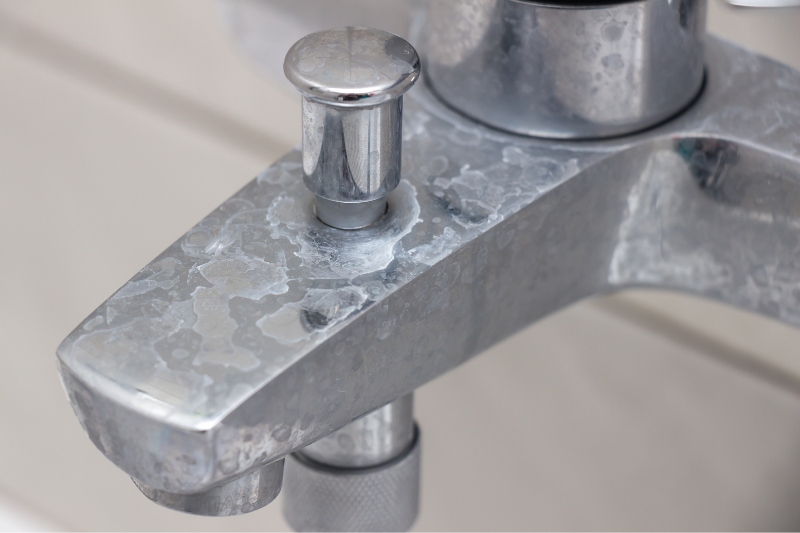
The Tooth of the Matter
If you’re a denture tablet user, the chances are, you already knew that they had a range of uses around the home. For the rest of us, it can come as quite a surprise that denture tablets can get their teeth into so many jobs, ridding us of limescale as well as all kinds of other unwelcome visitors.
If you need to banish some limescale with some borrowed denture tablets, make sure once you’ve used them that you replace whatever you’ve used. That denture wearer will not see the funny side when they encounter an empty packet. No matter how quickly you can now make them a cup of tea.

Martin’s life revolves around films, dogs and food, but rarely all at the same time. At least two out of these three like to give clothes and furniture a hard time, and Martin enjoys discovering and writing about new ways to stop them doing their worst.
